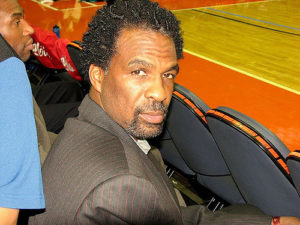On February 8th, retired New York Knicks star Charles Oakley was forcibly removed from Madison Square Garden (MSG) during a Knicks-Clippers game. Oakley was charged with three counts of misdemeanor assault and one count of criminal trespass after he got into a scuffle with a number of MSG security officials. He is accused of striking one security official in the face and for pushing two other security officials as they attempted to intervene. While Oakley contends that he did nothing wrong, Knicks officials claim that he was causing trouble and was bothering Knicks owner James Dolan.
According to Sports Illustrated, Dolan may have escalated the conflict after conducting a radio interview shortly after the altercation. Dolan stated, on air, that Oakley “suffers from a ‘problem with anger’ and that Oakley is ‘both physically and verbally abusive,’ which Dolan—who does not appear to have any formal training in medicine—classified as ‘personality problems.’ Dolan also speculated that Oakley ‘may have a problem with alcohol.’”
Oakley’s attorney said that he would deal with these statements “in a court of law.” This means that Oakley and his attorney will likely file a defamation suit against Dolan for his statements. In order for Oakley to succeed in a defamation lawsuit, he would have to prove that Dolan’s statements were specific, not vague, expressed as a factual statement, and that the alleged defamation caused him some kind of injury.
It seems possible that a court could rule that Dolan did offer specific and factual-sounding statements regarding Oakley’s alleged “problem with anger,” “abusive[ness]” and “personality problems.” However, the insertion of Dolan’s qualifying, “may” in his statement about Oakley’s alleged “problem with alcohol,” could remove such a comment from being considered specific and factual-sounding. As a public figure, another hurdle in Oakley’s potential defamation lawsuit would be his need to prove that Dolan made his statements with “actual malice.” As a legal term of art, actual malice is present when a defendant not only makes defaming and untrue statements, but when a defendant knows or should have known that the statements were untrue. This could be a difficult hurdle for Oakley to overcome.
Lastly, it is important for Oakley to remember that truth is an absolute defense for Dolan. If Oakley does in fact have any of the issues that Dolan mentioned in his interview after the scuffle, Dolan would likely not be held liable for having committed any kind of defamation.
Nick Aquart is a Sports Highlight Contributor for the Harvard Journal of Sports and Entertainment Law and a current first year student at Harvard Law School (Class of 2019).

